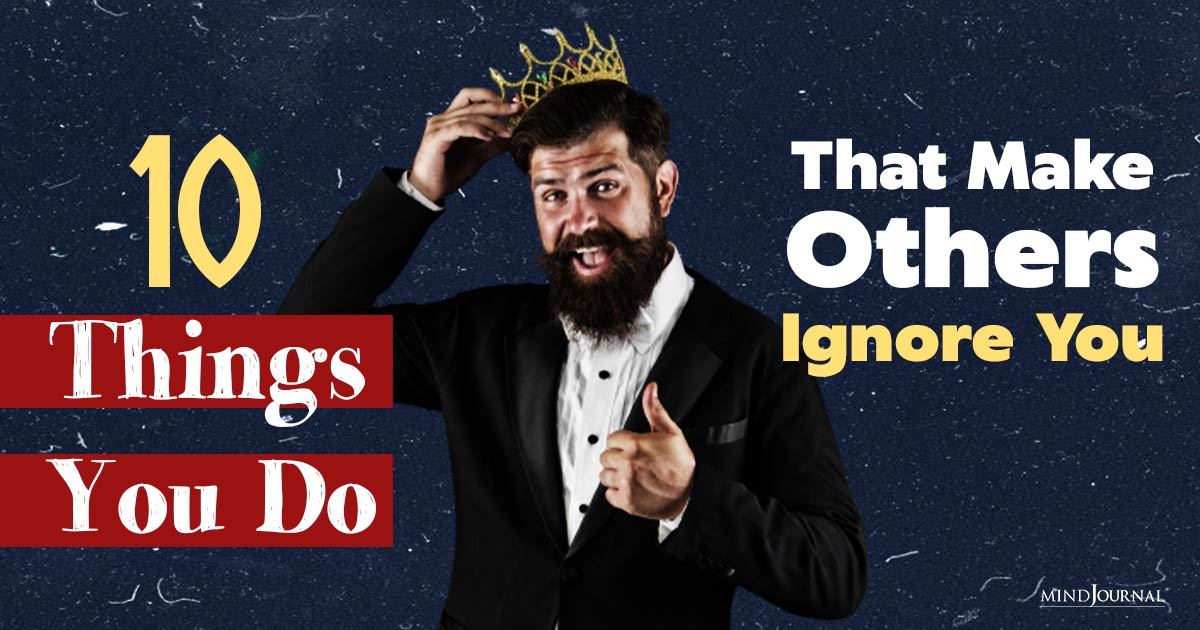Have you ever found yourself feeling invisible in a social setting? Have you ever felt like people don’t take you seriously or ignore what you say, even though you mean well?
You try to join a conversation, but it seems like no one is interested in what you have to say. You wonder why people are ignoring you, even though you’re trying your best.
The truth is, there may be some subconscious things you’re doing that are turning people off without you even realizing it.
In this article, we’re going to explore 10 subconscious things you likely do that make others ignore you.
10 Subconscious Things You Do That Make Others Ignore You
1. Negative body language
Body language says a lot about a person, even without them uttering a word. One of the things that can make others ignore you is poor body language.
When you underestimate the power of maintaining eye contact, having an open posture, and a friendly smile, you will get snubbed more often than not.
Moreover, constantly fidgeting with your hands, hair, or clothing while speaking is distracting and shows a lack of poise that makes others take you less seriously.
So, catch yourself when fidgeting takes over and place your hands calmly. Remember, stand tall, keep those eyes engaged, and let your body language exude warmth and confidence!
Read Your Body Language Doesn’t Lie. 40+ Body Language Signs And Cues To Strip Down Someone’s Personality
2. Interrupting
Have you ever caught yourself interrupting others while they’re talking? Well, if you are subconsciously more prone to talking than listening to others, then it can make people ignore you.
When we constantly interrupt others, it sends a signal that we don’t value their thoughts or opinions. So, let others speak, listen actively, and show them that you genuinely care about what they have to say.
3. Always complaining
Ah, the art of complaining! While it’s natural to vent once in a while, constantly complaining can be a major turnoff for others. Negativity breeds negativity.
So, try to focus on the positive aspects of life and spread some optimism around. People will be more drawn to your positive energy and will be less likely to ignore you.
4. Bragging excessively
We all love to share our accomplishments, and it’s perfectly fine to be proud of our achievements. However, when we constantly brag about ourselves, it can unintentionally create distance between us and others.
Instead, take an interest in other people’s lives, ask questions, and show genuine curiosity. By doing so, you’ll foster deeper connections and people will be less inclined to ignore you.
5. Inability to listen
Listening is an art that many of us struggle with. But it’s an important one! When you fail to actively listen and show interest in what someone is saying, it can make them feel unimportant or undervalued.
So, put away distractions, focus on the person in front of you, and truly listen. Show empathy, ask follow-up questions, and let them know you genuinely care.
6. Apologizing too much
Saying sorry for no reason sets the subconscious tone that you’re not worth listening to. When you apologize excessively for minor things, even before you speak, people perceive you as weak and not confident.
Unnecessarily saying things like “sorry to bother you” and “I’m sorry if this sounds stupid” conditions others to tune you out right from the start. Limit your apologies to when you genuinely did something wrong, not as a tic before speaking.
7. Dominating conversations
Do you speak loudly or talk over others? When you don’t give others a chance to speak, they can feel disrespected and undervalued.
Instead of talking constantly, be mindful of how much you’re speaking. Make sure to listen to others and wait for the other person to finish speaking before chiming in. If you tend to get excited and talk too much, take a breath and give others a chance to speak.
8. Frequently using filler words
Filler words like “like,” “um,” and “you know” come off as speaking without much confidence or thought. When you rely on filler words, people assume you don’t have much value to add and tune you out.
Although filler words are sometimes unavoidable, aim to reduce them by practicing your points in advance and speaking at a natural pace without rushing. Speak more deliberately when important information is at stake.
9. Weak or timid voice
The tone, volume, and clarity of your voice greatly impact how much others listen. A voice that’s too soft, hesitant, or mumbly suggests a lack of confidence and authority that prompts others to ignore what you say.
Practice speaking with a fuller, steadier tone and enunciate clearly, even if it feels unnatural at first. Increase your volume slightly when necessary without yelling. A stronger voice commands others to pay attention to your words.
10. Being easily distracted
Are you more focused on using your phone than the other person during social interactions? Whether you’re scrolling through social media or replying to a text, looking down at your phone sends a message that you’re not fully present in the conversation.
This can make the other person feel like you’re not interested in what they have to say. So, if you want to be more engaging, put your phone away and give the other person your full attention.
So, there you have it, 10 subconscious behaviors that might be unintentionally pushing people away.
By being aware of these subconscious habits, we can make a conscious effort to be more engaging in social situations.
Want to share your wisdom with the world?










Leave a Reply